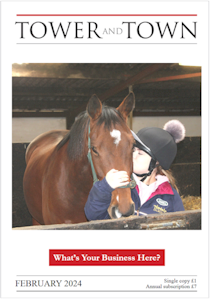

Tower and Town, February 2024 (view the full edition) (view the full edition)Gaza: My Time With The PalestiniansI left the medical practice in Marlborough in 1992, looking for a change, and joined Medical Aid for Palestinians (MAP) as a volunteer for the next three years. I spent my first year in Hebron in the West Bank which then had a population of 250,000 Palestinians with a heavily protected settlement for 400 Jews in the City centre. I used to feel the tension as I walked from my tiny flat above a welder's shop to the paediatric hospital where I had a teaching role. There I worked in particular with Sharif, one of its consultants. He and his family generously invited me to spend many Fridays (the Islamic day of rest) with them, often working in his olive grove. Soon after I left, this was taken from them and is now on the other side of the wall built by the Israelis. I have vivid memories of being in one of their rooms lit by a single lamp, pressing their olives - the wonderful smell of new oil! The next two years I spent in Gaza giving courses to primary care doctors. I visited all the hospitals in Gaza City but got to know best the doctors in the Ali Ahli Arab Hospital (run by the Anglican Diocese of Jerusalem), now very badly damaged. I was overwhelmed by the hospitality given me - wonderful dishes of baba ghanoush - when I knew that the families I visited often had little to give. I shared a house with three other MAP volunteers on the edge of Jabalia Refugee Camp, the largest in Gaza city. The UN said it was the most densely populated place on earth. In the evenings, I swam off the beach with the Palestinian men (but not women), with the risks of the sewage outflows. My only real breaks were to travel by bush taxi to Jerusalem. I was allowed through the check points with my British passport but had to watch most of the Palestinians being turned back, unable to leave Gaza to work, or indeed for anything else. I shall never forget hearing that the Chief Medical Officer's son who had a brain injury from a flying bullet was denied entry to a more sophisticated Palestinian hospital in Jerusalem, and subsequently died. Hamas was a rudimentary organisation then, working alongside three other Palestinian political groups in Gaza. They all had clinics. One of my last tasks was to supervise the allocation of one million euros worth of drugs. The three took their shares and sold them on the black market but Hamas made sure they were used in their clinics. I could feel the tensions and frustration from all the restrictions upon daily life imposed by Israel, which were building up when I was there thirty years ago. Sadly, these have been left to grow and the political scene has completely changed. Andrew Reekie |